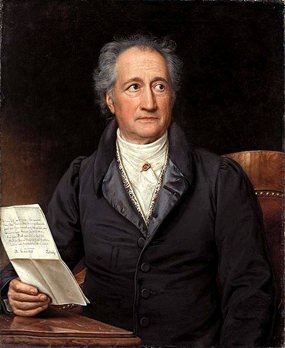Ships that sail the seas

Mastermind: Johann Wolfgang von Goethe.
When I was a very small
boy, living on a grey island far, far away, there was a framed print on my
bedroom wall which displayed the text of an old Breton prayer. It included the
sentence ma barque est si petite; votre mer est si grande. At the time,
I assumed it meant “My bark is so small; your mother is so big”. I pondered the
possible meanings of this Delphic sentence for some considerable time until it
was explained to me that barque means “ship” and mer means “sea”.
Only the other day, a
friend reminded me that the word barque is related to the Italian
barca which also gives its name to the musical word barcarole. This
was a type of lilting song popular with Venetian gondoliers, the triple metre
being vaguely reminiscent of the slow and measured rowing strokes used to propel
the boat. The word was sometimes used to describe instrumental music in a
similar lilting style.
The very mention of boats
brings to my mind John Masefield’s short poem, Cargoes which begins
theatrically enough with the line, “Quinquireme of Nineveh from distant Ophir”.
And if your maritime history is a bit hazy, I shall leave you to find out about
quinquiremes for yourself. Assuming of course, that you feel it’s worth the
effort.
The German poet Johann
Wolfgang von Goethe was an extraordinary multi-talented individual and was one
of the greatest German writers, thinkers and scientific theorists of all time.
I only mention him because in 1795 he wrote two short but oddly expressive poems
called Calm Sea and Prosperous Voyage. Although they have only
eighteen lines between them, these two poems inspired musical works by several
composers, notably Mendelssohn, Beethoven, and Schubert.
Ludwig
van Beethoven (1770-1827): Calm Sea and Prosperous Voyage, Op. 112.
Warsaw Boys Choir,
Frederic Chopin
University of Music Symphony Orchestra, Poland cond. Krzysztof Kusiel Moroz
(Duration: 08:50 Video: 1080p HD)
Mention the title and most
people will think of Mendelssohn, because in 1827 he wrote an orchestral
concert overture inspired by Goethe’s verses. However, twelve years before - in
1815 - Beethoven had set the same poems as a short cantata for choir and
orchestra. This small masterpiece has been described as “one of the most
overlooked works in Beethoven’s output”. Yet it’s thoroughly charming and
beautifully performed by these young musicians from Poland, recorded in top
quality video. Incidentally, Beethoven actually knew Goethe well and had
admired Goethe’s poetry since his youth.
You’d be forgiven for
assuming that Calm Sea and Prosperous Voyage mean more-or-less the
same thing. But not so. In the days of sailing ships, a totally silent, calm
sea with no wind was cause for fear and alarm. The first poem is about a ship
hopelessly becalmed, while the second one describes how the wind lifts and the
vessel joyfully continues its journey towards land.
Ships have also featured
in operas. You may recall that Gilbert and Sullivan opera which takes place
aboard the HMS Pinafore and was first performed in 1878. Then there are
the fine sea operas of Benjamin Britten which at least owe something to Richard
Wagner’s opera The Flying Dutchman, first performed in 1843. But this
was a very different ship to the comically-named HMS Pinafore.
Richard
Wagner (1813-1883): Overture, The Flying Dutchman.
National
Children’s Orchestra of Great Britain (Main Orchestra) cond. Howard Williams
(Duration: 09:54 Video: 360p)
The Flying Dutchman
is a legendary ghost-ship destined to roam the oceans forever. In his 1870
autobiography Mein Leben (“My Life”) Richard Wagner claimed that he had
been inspired to write the opera following a stormy sea crossing he made from
Riga (now in Latvia) to Britain in July and August 1839.
It had been a particularly
bad year for him and he was heavily in debt. He was forced to leave the country
illegally with his long-suffering wife Minna and Robber, their enormous
Newfoundland dog. The voyage was neither calm nor prosperous, because they
encountered mountainous seas and ferocious storms, one of which almost wrecked
the ship. What should have been a voyage of a few days, turned out to be a
nightmare lasting three and a half weeks.
You can still sense the
terror of the storm in the opening bars of the overture. This is a spirited
performance by one of Great Britain’s youngest orchestras, splendidly conducted
by Howard Williams who has performed over seventy different operas, mostly with
the English National Opera.
Oh, and just in case
you’re still wondering about the Breton prayer I mentioned at the start, here it
is in full:
Protégez-moi, mon
Seigneur,
Ma barque est si petite,
Votre mer est si grande.
I can’t help wondering
whether Richard Wagner might have uttered rather similar words during his
horrific voyage in the summer of 1839.

